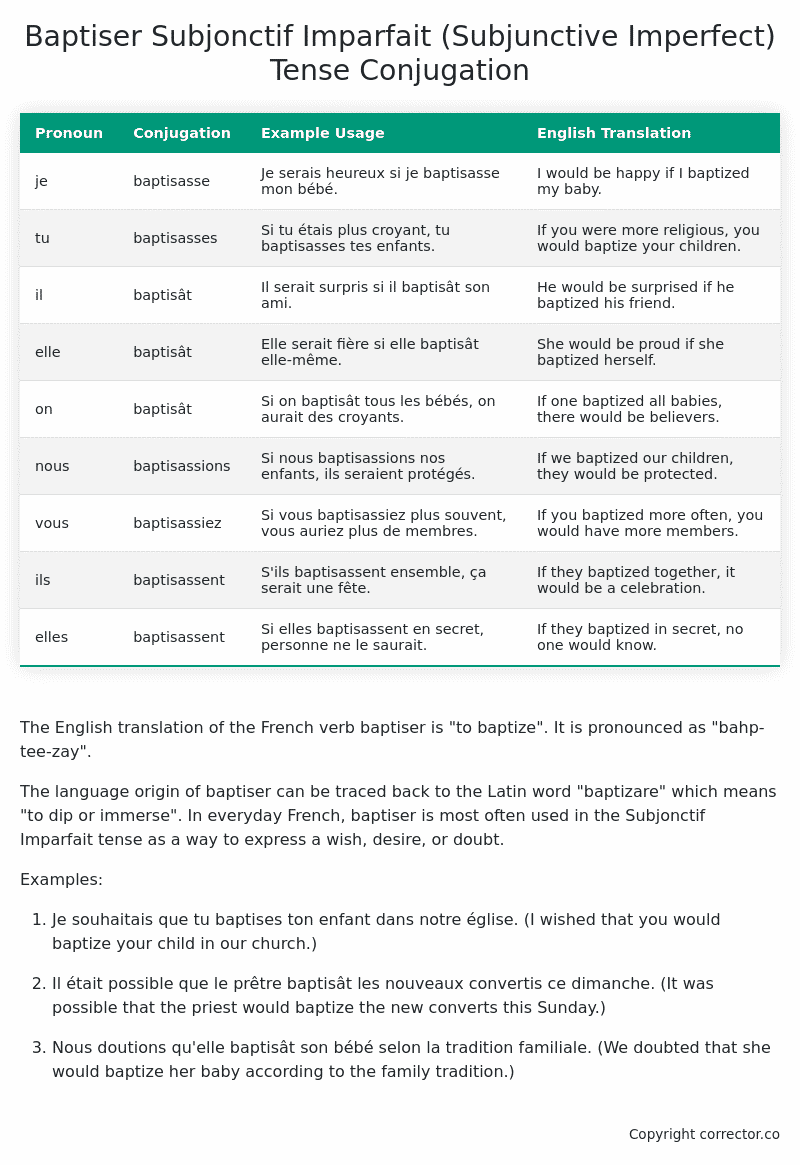Subjonctif Imparfait (Subjunctive Imperfect) Tense Conjugation of the French Verb baptiser
Introduction to the verb baptiser
The English translation of the French verb baptiser is “to baptize”. It is pronounced as “bahp-tee-zay”.
The language origin of baptiser can be traced back to the Latin word “baptizare” which means “to dip or immerse”. In everyday French, baptiser is most often used in the Subjonctif Imparfait tense as a way to express a wish, desire, or doubt.
Examples:
-
Je souhaitais que tu baptises ton enfant dans notre église. (I wished that you would baptize your child in our church.)
-
Il était possible que le prêtre baptisât les nouveaux convertis ce dimanche. (It was possible that the priest would baptize the new converts this Sunday.)
-
Nous doutions qu’elle baptisât son bébé selon la tradition familiale. (We doubted that she would baptize her baby according to the family tradition.)
Table of the Subjonctif Imparfait (Subjunctive Imperfect) Tense Conjugation of baptiser
| Pronoun | Conjugation | Example Usage | English Translation |
|---|---|---|---|
| je | baptisasse | Je serais heureux si je baptisasse mon bébé. | I would be happy if I baptized my baby. |
| tu | baptisasses | Si tu étais plus croyant, tu baptisasses tes enfants. | If you were more religious, you would baptize your children. |
| il | baptisât | Il serait surpris si il baptisât son ami. | He would be surprised if he baptized his friend. |
| elle | baptisât | Elle serait fière si elle baptisât elle-même. | She would be proud if she baptized herself. |
| on | baptisât | Si on baptisât tous les bébés, on aurait des croyants. | If one baptized all babies, there would be believers. |
| nous | baptisassions | Si nous baptisassions nos enfants, ils seraient protégés. | If we baptized our children, they would be protected. |
| vous | baptisassiez | Si vous baptisassiez plus souvent, vous auriez plus de membres. | If you baptized more often, you would have more members. |
| ils | baptisassent | S’ils baptisassent ensemble, ça serait une fête. | If they baptized together, it would be a celebration. |
| elles | baptisassent | Si elles baptisassent en secret, personne ne le saurait. | If they baptized in secret, no one would know. |
Other Conjugations for Baptiser.
Le Present (Present Tense) Conjugation of the French Verb baptiser
Imparfait (Imperfect) Tense Conjugation of the French Verb baptiser
Passé Simple (Simple Past) Tense Conjugation of the French Verb baptiser
Passé Composé (Present Perfect) Tense Conjugation of the French Verb baptiser
Futur Simple (Simple Future) Tense Conjugation of the French Verb baptiser
Futur Proche (Near Future) Tense Conjugation of the French Verb baptiser
Plus-que-parfait (Pluperfect) Tense Conjugation of the French Verb baptiser
Passé Antérieur (Past Anterior) Tense Conjugation of the French Verb baptiser
Futur Antérieur (Future Anterior) Tense Conjugation of the French Verb baptiser
Subjonctif Présent (Subjunctive Present) Tense Conjugation of the French Verb baptiser
Subjonctif Passé (Subjunctive Past) Tense Conjugation of the French Verb baptiser
Subjonctif Imparfait (Subjunctive Imperfect) Tense Conjugation of the French Verb baptiser (this article)
Subjonctif Plus-que-parfait (Subjunctive Pluperfect) Tense Conjugation of the French Verb baptiser
Conditionnel Présent (Conditional Present) Tense Conjugation of the French Verb baptiser
Conditionnel Passé (Conditional Past) Tense Conjugation of the French Verb baptiser
L’impératif Présent (Imperative Present) Tense Conjugation of the French Verb baptiser
L’infinitif Présent (Infinitive Present) Tense Conjugation of the French Verb baptiser
Struggling with French verbs or the language in general? Why not use our free French Grammar Checker – no registration required!
Get a FREE Download Study Sheet of this Conjugation 🔥
Simply right click the image below, click “save image” and get your free reference for the baptiser Subjonctif Imparfait tense conjugation!

Baptiser – About the French Subjonctif Imparfait (Subjunctive Imperfect) Tense
Formation
Common Everyday Usage Patterns
Interactions with Other Tenses
Subjonctif Présent
Indicatif Passé Composé
Conditional
Conditional Perfect
Summary
I hope you enjoyed this article on the verb baptiser. Still in a learning mood? Check out another TOTALLY random French verb conjugation!


